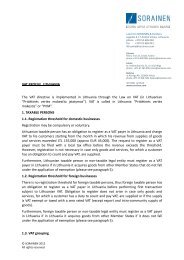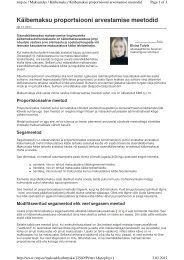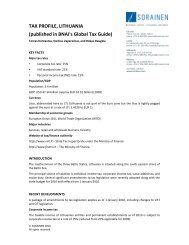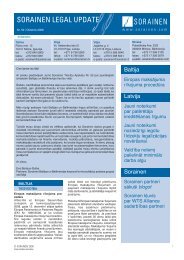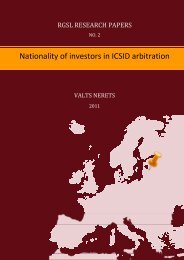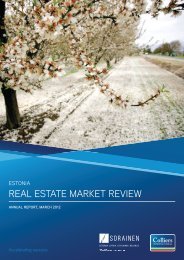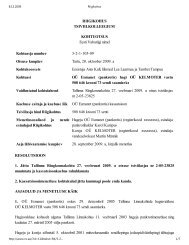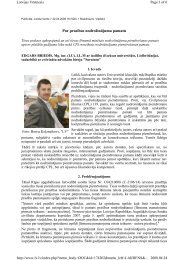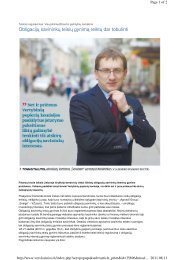Employee Share Plans in Europe and the USA - Sorainen
Employee Share Plans in Europe and the USA - Sorainen
Employee Share Plans in Europe and the USA - Sorainen
Create successful ePaper yourself
Turn your PDF publications into a flip-book with our unique Google optimized e-Paper software.
<strong>Employee</strong> <strong>Share</strong> <strong>Plans</strong> <strong>in</strong> <strong>Europe</strong> <strong>and</strong> <strong>the</strong> <strong>USA</strong>Russian Federation4.3 Tax withhold<strong>in</strong>gprovid<strong>in</strong>g <strong>the</strong> securities, <strong>the</strong>re are no payments or compensationconnected to <strong>the</strong> employee's employment contract <strong>and</strong>, consequently,no basis on which social security contributions can arise.Social security contributions are paid to <strong>the</strong> social security funds, (i.e.<strong>the</strong> Pension Fund, <strong>the</strong> Social Insurance Fund <strong>and</strong> <strong>the</strong> CompulsoryMedical Insurance Fund). Social security contributions are capped on<strong>in</strong>come up to RUB 415,000 for 2010. The total contribution rate is set at26% for <strong>the</strong> 2010 calendar year <strong>and</strong> 34% for 2011. 13The employer has <strong>the</strong> duty to withhold <strong>in</strong>dividual <strong>in</strong>come tax if an employeepurchases shares at less than market value directly from <strong>the</strong> employer.However, it is less clear whe<strong>the</strong>r <strong>the</strong> withhold<strong>in</strong>g obligation arises for <strong>the</strong>employer if <strong>the</strong> shares are provided to an employee by <strong>the</strong> employer's parentcompany or ano<strong>the</strong>r third party. 14Should <strong>the</strong> duty to withhold arise, <strong>the</strong> employer must withhold <strong>the</strong> <strong>in</strong>come taxfrom any cash payments made to <strong>the</strong> employee, i.e. from <strong>the</strong> employee's salaryor o<strong>the</strong>r remuneration. If <strong>the</strong> employer is not able to withhold <strong>the</strong> <strong>in</strong>come tax (e.g.if <strong>the</strong> amount of salary paid <strong>in</strong> cash is <strong>in</strong>sufficient to cover <strong>the</strong> amount of <strong>in</strong>cometax for <strong>the</strong> particular month <strong>in</strong> which it is to be withheld), <strong>the</strong> employ<strong>in</strong>g entitymust notify <strong>the</strong> tax authorities of this <strong>in</strong> writ<strong>in</strong>g with<strong>in</strong> one month after <strong>the</strong> date onwhich <strong>the</strong> withhold<strong>in</strong>g obligation arises. It should be noted that withhold<strong>in</strong>gs from13The 34% rate, which comes <strong>in</strong>to effect from 1 January 2011, will be unified for most categories oftaxpayers (e.g. <strong>the</strong>re will be no exemption available for taxpayers us<strong>in</strong>g <strong>the</strong> simplified tax system).However, certa<strong>in</strong> groups of taxpayers will benefit from a 4-year transitional period (e.g. <strong>the</strong> rates forresidents of special economic zones would be limited to 20.2% <strong>in</strong> 2011 – 2012 <strong>and</strong> 27.1% <strong>in</strong> 2013 –2014.14 Accord<strong>in</strong>g to <strong>the</strong> Russian Tax Code, <strong>in</strong>dividual <strong>in</strong>come tax is to be withheld by <strong>the</strong> employ<strong>in</strong>g entityfrom any <strong>in</strong>come that an <strong>in</strong>dividual employee receives from it or which orig<strong>in</strong>ates as a result of <strong>the</strong>relationship with it. This word<strong>in</strong>g can be <strong>in</strong>terpreted quite broadly, <strong>and</strong> if an employee purchasesshares <strong>in</strong> its employer's parent company at less than <strong>the</strong>ir market value, whe<strong>the</strong>r directly from <strong>the</strong>parent or from a third party, <strong>the</strong>re may be room to argue that <strong>the</strong> employee has obta<strong>in</strong>ed <strong>the</strong> benefitonly due to his employment with <strong>the</strong> employer, i.e. as a result of <strong>the</strong> relationship with <strong>the</strong> employer,which may give rise to <strong>the</strong> fur<strong>the</strong>r argument that <strong>the</strong> employer should withhold <strong>in</strong>dividual <strong>in</strong>come tax.On <strong>the</strong> o<strong>the</strong>r h<strong>and</strong>, however, one might argue that as long as (i) <strong>the</strong> parent company does not provide<strong>the</strong> employer with any calculation of <strong>the</strong> benefits realised by <strong>in</strong>dividual employees <strong>in</strong> Russia, <strong>and</strong> (ii) nocosts associated with sell<strong>in</strong>g <strong>the</strong> shares to <strong>the</strong> employees at less than market value are charged backto <strong>the</strong> Russian employer, <strong>the</strong>n no withhold<strong>in</strong>g tax liability should arise for <strong>the</strong> local employer, as it wouldsimply lack <strong>the</strong> <strong>in</strong>formation necessary to calculate <strong>and</strong> withhold <strong>the</strong> tax due.UK/1729295/03 166 September 2010



